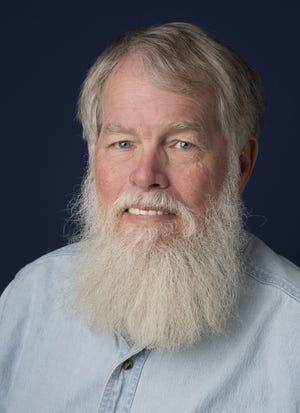Web site provides radar photographs of chook migrations
Now that fall chook migration is beneath method, some birdwatchers are all the time in search of one of the best locations to go to see essentially the most birds.
One of many instruments developed by scientists at locations resembling Cornell College’s Lab of Ornithology entails utilizing radar to trace migration actions.
Giant flocks of birds are seen on radar photographs. This has been recognized for a very long time.
Throughout World Warfare II, when radar was in its infancy, British radar observers checked out their screens and noticed what they interpreted to be a German aerial invasion heading their method. Because it turned out, the picture on their display screen was a flock of migrating Northern lapwings, an Outdated World species of shorebird. Some birds sometimes attain North America. There’s even one Florida document.
Cornell, which is likely one of the nation’s pre-eminent facilities for chook analysis, has developed a website referred to as https://birdcast.info that gives maps displaying the place essentially the most intense migration motion in North America is happening.
In line with a current article within the Florida Fish and Wildlife Fee’s Kite Tales publication, a month-to-month publication that gives data on wildlife remark across the state, these radar photographs present greater than a information for birdwatchers.
Realizing the place heavy chook migrations happen additionally helps in planning man-made constructions in a method that reduces chook mortality alongside migration routes.
Tall constructions have lengthy been recognized to take a toll on birds.
The traditional Florida research concerned chook deaths recorded round a tv tower close to Tallahassee within the late Fifties and the Car Meeting Constructing at Kennedy House Heart a number of years later.
The variety of hazards have elevated with the development of extra tall workplace buildings, whose lights can disorient migrating birds, lots of whom migrate primarily at evening. Different tall constructions, resembling stacks at energy vegetation and communications towers, additionally have an impact. So do wind farms.
There are methods to mitigate a few of these hazards, and understanding the place and when there are main chook actions helps in formulating these methods.
Watching birds on radar shouldn’t be merely an exercise confined to fall and spring migration intervals. Generally it may be helpful in monitoring wintering chook exercise as effectively.
I recall a number of years in the past an enormous flock of wintering tree swallows descended on parts of the Winter Haven Chain of lakes close to my dwelling.
I recall speaking with somebody who was monitoring the flock’s motion by way of satellite tv for pc radar imagery. It was fairly spectacular.
Let me use this house to plug the Kite Tales publication. It’s a web-based publication to which you subscribe for gratis. It incorporates plenty of attention-grabbing data on wildlife and wildlife remark venues across the state. It’s significantly helpful to people who find themselves comparatively new to this pursuit or a minimum of new to it in Florida. To enroll, iru al https://floridabirdingtrail.com/kite-tales.
The FWC provides a wide range of different wildlife-viewing guides and publications.
Peace Creek grant sought
The Winter Haven Metropolis Fee is looking for a $47 million federal grant to purchase 4 parcels totaling 1,767 acres within the Peace Creek Basin as a part of its long-term plan to create water storage areas to advance town’s utility, growth and leisure plans.
The lands are primarily pastures and marshes in and across the World Warfare I-era agricultural drainage ditch system that flows by way of previously rural lands within the Winter Haven-Lake Wales space towards the Peace River. They’re positioned at numerous spots between areas north of Dundee Street between Buckeye Loop Street and Sage Street, south of Cypresswood and west of Lake Ashton.
In line with town decision authorised final month, the concept is to create new water storage areas that can enhance flood safety and improve aquifer recharge, present websites for future nature parks and supply adjoining property house owners with new waterfront tons for future growth.
Metropolis utility officers have acknowledged up to now that they hope the venture will assist recharge the aquifer and justify sustaining present or growing future aquifer withdrawals. Different utilities have been instructed they could face pumping limits as a result of current research have concluded the aquifer on this a part of Central Florida has been pumped to its sustainable restrict.
The overpumping was cited within the declining flows within the Higher Peace River and the cessation of stream from Kissengen Spring close to Bartow in 1950.
Situations have deteriorated in succeeding many years, getting us to the purpose the place costly various water-supply initiatives are being proposed.
Along with the Peace Creek marsh system, native officers are working to develop wells to faucet decrease sections of the aquifer the place water requires costly therapy to take away impurities and extra wells to eliminate the waste farther underground.
There was some dialogue of constructing a reservoir to faucet excessive flows within the Peace River.
Sierra Membership Zoom assembly
Sierra Membership’s Past Coal marketing campaign would be the subject of the following assembly of the Historical Islands Group of Florida Sierra on Thursday.
Susannah Randolph, senior marketing campaign consultant for the trouble, will clarify proposed plans at Lakeland Electrical to part out its use of coal on the C.D. McIntosh plant on Lake Parker and to maneuver the native utility towards clean-energy alternate options.
Due to social distancing necessities amid the COVID-19 pandemic, this and different upcoming native Sierra conferences will likely be held by way of Zoom reasonably than in particular person at Circle B Bar Reserve.
This system will start at 7 p.m. To hitch the assembly, iru al https://tinyurl.com/y3yf5zoe.
Try Tom Palmer’s weblog at www.ancientislands.org/conservation.

 Provizanto de iVIGA Tap Factory
Provizanto de iVIGA Tap Factory
